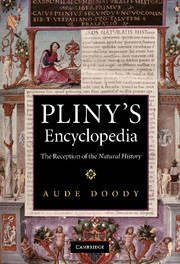Book contents
- Frontmatter
- Contents
- Acknowledgements
- Note on the text
- Introduction: how to read an encyclopedia
- 1 Science and encyclopedism: the originality of the Natural History
- 2 Diderot's Pliny and the politics of the encyclopedia
- 3 Finding facts: the summarium in the early printed editions
- 4 Specialist readings: art and medicine from the Natural History
- Conclusion: changing approaches to Pliny's Natural History
- Bibliography
- Index
Conclusion: changing approaches to Pliny's Natural History
Published online by Cambridge University Press: 04 May 2010
- Frontmatter
- Contents
- Acknowledgements
- Note on the text
- Introduction: how to read an encyclopedia
- 1 Science and encyclopedism: the originality of the Natural History
- 2 Diderot's Pliny and the politics of the encyclopedia
- 3 Finding facts: the summarium in the early printed editions
- 4 Specialist readings: art and medicine from the Natural History
- Conclusion: changing approaches to Pliny's Natural History
- Bibliography
- Index
Summary
The Natural History is a powerful text, not least for the fantastic claims it makes in its preface, the assurance that life itself is the subject of investigation. It has also had a pivotal role in brokering information to subsequent generations of scholars, right up to the present day. Requirements have changed, his centrality has been lost, but the usefulness of Pliny remains. I have engaged here with a particular model of using the Natural History, one that assimilates the text to a later tradition of encyclopedic writing. This book has been more concerned with the encyclopedia as book than with encyclopedism as the will to knowledge. There is more that might be said about Pliny's encyclopedism, in the latter sense, the particular vision of complete knowledge he presents, and the philosophy that might support it. But before that is possible, we need to examine the assumptions about encyclopedias that we bring to the text, assumptions that have tended to make the Natural History an amateurish compilation, self-evident in its premises and its choices. I have traced the antecedents of this image of Pliny to a particular set of nineteenth-century concerns, when the rise of specialisation within the academy and the new demands of Quellenforschung produced the conditions for the emergence of Pliny as a dull and pedantic compiler of other scholars' more interesting work.
- Type
- Chapter
- Information
- Pliny's EncyclopediaThe Reception of the Natural History, pp. 173 - 174Publisher: Cambridge University PressPrint publication year: 2010



